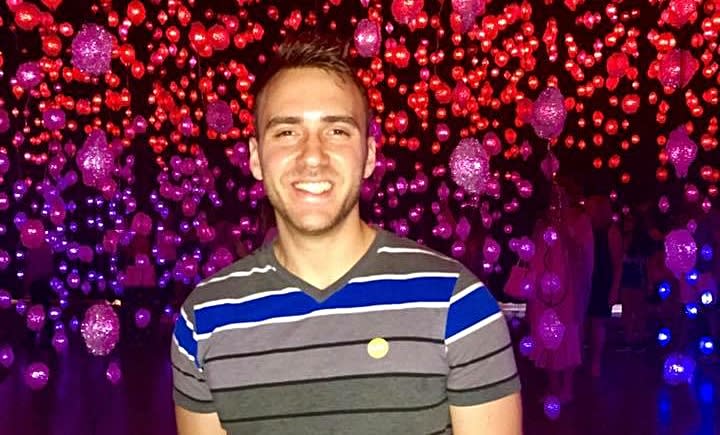Like most college freshmen, Alan Prewitt showed up on the Texas A&M campus overwhelmed and a little intimidated. The self-described “quirky band nerd” wasn’t sure how he would fit in at this conservative university of more than 50,000 students. So he threw himself into every organization he could—from student government to band—and soon developed a social circle he still counts on today.
Fast-forward a few years and Prewitt found himself once again in a new environment: the fourth-largest city in the country, newly out as gay and without a network of friends. This time, thanks to his Aggie training he knew what to do—he’d create a networking group for people like himself. Five years later Lambda NextGen is one of the most successful LGBT nonprofits in recent Houston history with a reach of more than 800 young professionals. We talked to Prewitt about the formation of Lambda, his coming out experience, and what makes Houston unique to him.
When did you come out?
It was actually my senior year at A&M. I found myself at a crossroads as many of my friends were preparing to be real adults and starting their lives. I realized that for me, that meant being honest about who I was and if I didn’t do it then, in this safe environment among friends at college, I might never do it. I came out my final semester to my family and friends and thankfully it was a positive experience.
Talk about your move to Houston.
I really didn’t know anyone so it was this whole process again of searching out and trying to find friends. Luckily I met my friend Mitchel at an oil and gas bar crawl. She would become a really good friend and eventually a roommate. She didn’t know anyone either really so we decided we would tackle Houston together. We did our first Pride together, joined organizations together went to bars together. We saw each other through all those things.
How did Lambda NextGen come about?
The struggle Mitchell and I would run into is that we would go to bars to try to meet friends and we would always end up at the wrong place that night, or people weren’t really receptive to meeting new people outside of their circle of friends. It was hard to meet others like us…I realized while there were a number of young professional groups, there was nothing really geared toward LGBT young professionals. I went back to my mentor in college who was running the LGBT Resource Center at A&M. I told him what was going on and he reminded me: “What do Aggies do when there isn’t something for them? They make it themselves.” So I decided I would do just that. I’d create a new normal for people like me.
How did it go at first?
I worked with a partner early on to help get the first few happy hours started, but that person soon moved to another city and it fell to me. At our first happy hour in January 2013 we had 35 people but it quickly grew from there through word-of-mouth. It was hard at first without much infrastructure but soon our happy hours were getting more than 100 attendees.
Were there some growing pains with that kind of rapid expansion?
Sure. At some point the happy hours were resembling a bar night out and I noticed that there was a sort of “hookup” vibe driving things instead of networking. So we tried to change the pace of things. We put more structure to it by incorporating as a nonprofit, creating a board of directors and expanding our reach…The organizations I had been involved with at A&M had various outlets for members—everything from social engagement to professional development to service. We decided Lambda would follow that model. We created different experiences for our people including service days and professional development workshops. I wanted to see people come up through Lambda, learn, become leaders and take that off to other organizations. I think that’s happening now.
As its founder, you’ve seen Lambda through a lot. What do you appreciate most about the organization?
I’m proud that we’ve created something that will outlast our involvement in it. That’s why it was so important to establish the actual nonprofit. I like that Lambda gives people the opportunity to experience something each month. They’ve come to expect what we give them, and that’s ok. Also this group seems to tap into a crowd that isn’t predominantly one thing. Our participants come from all different backgrounds, races and professions. Early on we had trouble attracting more women to our events and I think we’ve made pretty good strides there. I think you see a group of people you wouldn’t otherwise get access to, and that’s a great thing. It’s given more young people living in Houston and searching out their peer group a new normal.
What’s your favorite thing about Houston?
Houston truly is a chameleon city. It’s one of the largest cities and it offers so much, you just have to be looking for or pursuing those things…And there’s such a melting pot nature to this city, with so much diversity, it’s bound to rub off on you and make you a better person.
To learn more about Lambda NextGen visit their website or Facebook page.


